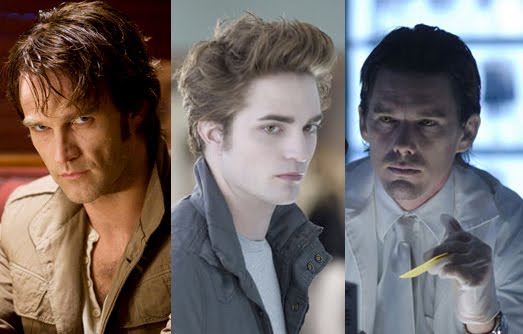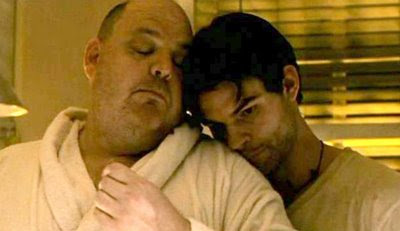The Year of the Vampire
If 2008 was the year of the zombie in the horror icon zodiac then 2009, looking toward 2010 is undoubtedly the year of the vampire. Films like 30 Days of Night paved the way for a new race of vampires in the form of HBO’s True Blood and the Twilight craze. But despite the hype, the question becomes inevitably why?
Past trends in horror have drawn on the fears of the culture that produces them. The slasher flicks of the 80s spoke to the prevailing fear of AIDS as a consequence of drug use and premarital sex. Likewise, the science fiction horror films of the 20s featured aliens as a metaphor for fears of communism and the Red Scare. In an era of horror dominated by torture porn fare like Saw and the Americanization of foreign horror, (The Ring, The Grudge) what is it about the new millennia that summons the ghastly specter of the Nosferatu from its dusty coffin?
The shadow of the millennial vampire cast its pall over the US at time when most of us where lying in the ruins of a virulent consumer economy. Years of quick credit and shoddy loans had kept the nation financially adrift until it all collapsed like a limp soufflé. Vampires represented an escape from the horrors of the great repression. Immortal and beautiful, vampires were immune to the ravages of time or economic downturns. They didn’t have to worry about an empty bank account or an ailing 401K. Vampires embodied the perfect consumer without any of the harsh consequences.
Like Romero’s zombies, the vampires of today are consumers, just like us. In Dawn of the Dead when Francine turns to Peter and asks about the horde of zombies trying to break into the mall, “What the hell are they?" Peter simply replies "They're us" In a similar fashion, the vampires of the new millennium are a monstrous reflection of our own consumerist habits as seen in the 2010 vampire film Daybreakers where “Everyone’s a vampire” in a world where blood is a dwindling commercial resource. Just as we consume the labor and resources of other countries in the form of products like oil, clothing and furniture, so do modern vampires in their very literal consumption of human blood.
 Consumerism begets consumerism and the popularity of vampire programs like True Blood and Twilight have spawned a legion of branded products ripe for human consumption. From an orange flavored TruBood to Twilight shower curtains, the allure of the vampire is more than sexual as fans are encouraged to reenact his nocturnal feedings with their pocket books.
Consumerism begets consumerism and the popularity of vampire programs like True Blood and Twilight have spawned a legion of branded products ripe for human consumption. From an orange flavored TruBood to Twilight shower curtains, the allure of the vampire is more than sexual as fans are encouraged to reenact his nocturnal feedings with their pocket books.
Beyond stimulating the economy, vampires have grown to encompass a wide range of meanings in the new millennium. From representing angsty teenage sexuality in Twilight and The Vampire Diaries to the plight of gays and minorities in True Blood, the modern vampire has made great strides in showcasing the infinite flexibility of the metaphor.
Up Next: Daybreakers: The Cure for the Common Vampire
Past trends in horror have drawn on the fears of the culture that produces them. The slasher flicks of the 80s spoke to the prevailing fear of AIDS as a consequence of drug use and premarital sex. Likewise, the science fiction horror films of the 20s featured aliens as a metaphor for fears of communism and the Red Scare. In an era of horror dominated by torture porn fare like Saw and the Americanization of foreign horror, (The Ring, The Grudge) what is it about the new millennia that summons the ghastly specter of the Nosferatu from its dusty coffin?
The shadow of the millennial vampire cast its pall over the US at time when most of us where lying in the ruins of a virulent consumer economy. Years of quick credit and shoddy loans had kept the nation financially adrift until it all collapsed like a limp soufflé. Vampires represented an escape from the horrors of the great repression. Immortal and beautiful, vampires were immune to the ravages of time or economic downturns. They didn’t have to worry about an empty bank account or an ailing 401K. Vampires embodied the perfect consumer without any of the harsh consequences.
Like Romero’s zombies, the vampires of today are consumers, just like us. In Dawn of the Dead when Francine turns to Peter and asks about the horde of zombies trying to break into the mall, “What the hell are they?" Peter simply replies "They're us" In a similar fashion, the vampires of the new millennium are a monstrous reflection of our own consumerist habits as seen in the 2010 vampire film Daybreakers where “Everyone’s a vampire” in a world where blood is a dwindling commercial resource. Just as we consume the labor and resources of other countries in the form of products like oil, clothing and furniture, so do modern vampires in their very literal consumption of human blood.
 Consumerism begets consumerism and the popularity of vampire programs like True Blood and Twilight have spawned a legion of branded products ripe for human consumption. From an orange flavored TruBood to Twilight shower curtains, the allure of the vampire is more than sexual as fans are encouraged to reenact his nocturnal feedings with their pocket books.
Consumerism begets consumerism and the popularity of vampire programs like True Blood and Twilight have spawned a legion of branded products ripe for human consumption. From an orange flavored TruBood to Twilight shower curtains, the allure of the vampire is more than sexual as fans are encouraged to reenact his nocturnal feedings with their pocket books.Beyond stimulating the economy, vampires have grown to encompass a wide range of meanings in the new millennium. From representing angsty teenage sexuality in Twilight and The Vampire Diaries to the plight of gays and minorities in True Blood, the modern vampire has made great strides in showcasing the infinite flexibility of the metaphor.
Up Next: Daybreakers: The Cure for the Common Vampire




The vampires of today represent the way humanity is. Weve become and all consuming creature on this earth, destroying everything in its path, doing everything possible to destroy the planet we live on.
ReplyDeleteIts no surprise vampire movies like Daybreakers are talking about changing everyone from what they are (vampires) to something better (humans) in a sense, some modern vampire movies are talking about changing many of the things that are wrong with modern living, and doing the right for once.
Out with the old way of thinking, in with the new. Something better, something useful, something that wil allow us to live happily for many more generations on this earth.
Thanks for helping us think through the deeper meaning of one the Western world's most significant horror icons. We do seem to oscillate between the vampire and zombie, both of which have something important to tell us about ourselves.
ReplyDeleteI feel that today's vampires represent our inability or unwillingness to face our fears. Indeed, Daybreakers will force us to consider our current state of affairs, but the Twilight vamps who walk in daylight, live beside us, and are perfect in every way prevent us from having to come face-to-face with that which scares us. They are completely devoid of Otherness and have no substance. Again, True Blood doesn't force us to confront any kind of threat, but rather to consider different ways of being.
ReplyDeleteSocial commentary abounds while our fears are pushed aside.